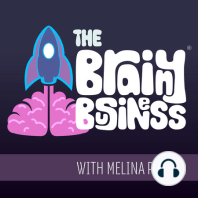50 min listen

56. Mental Accounting: How To Make Your Money Math Work For You: A Behavioral Economics Foundations Episode
FromThe Brainy Business | Understanding the Psychology of Why People Buy | Behavioral Economics
56. Mental Accounting: How To Make Your Money Math Work For You: A Behavioral Economics Foundations Episode
FromThe Brainy Business | Understanding the Psychology of Why People Buy | Behavioral Economics
ratings:
Length:
47 minutes
Released:
Jul 12, 2019
Format:
Podcast episode
Description
Hopefully, you tuned in last week for the special anniversary episode, where I went over the top episodes by downloads, your votes and some of my favorites. I also gave some of my book recommendations and a sneak peek behind the scenes with the top questions I get asked, the weird thing I hear all the time now…and so much more. Today, we are back into the swing of things with a behavioral economics foundations episode on mental accounting. This concept was mentioned briefly in the biases series, but today we are going to dig into what this really is and just how much it impacts our approach to money, risk, time and more. CLICK HERE FOR YOUR FREE DOWNLOAD! Show Notes: [05:02] The concept of mental accounting was introduced by nobel prize winner Richard Thaler, and is based on humans’ illogical approach to value in relative terms instead of looking at it as an absolute. [05:31] Three examples by Richard Thaler of mental accounting. [07:41] These are all examples of the way that mental accounting can impact the decisions we make. [08:17] Money and accounts should be perfectly fungible (that is an economics term for interchangeable). It shouldn’t matter if money was in a savings account, or a checking account or your pocket or a 401k…it would all exchange exactly the same. [09:32] Our brain segregates when thinking about money. This is one of the reasons the field of behavioral economics was needed…traditional economics does not account for the importance of this phenomenon. [10:10] The three ways money is commonly labeled: expenses are grouped into budgets like food, rent, and entertainment. Wealth is separated into accounts (checking, emergency or “rainy day” funds, and retirement). And lastly income is looked at in categories: namely regular or windfall. [12:35] Much like regular accounting, in mental accounting, individuals will book and post any occurring or planned transactions to the mental account. [15:59] When businesses are reporting their year-end earnings and losses, they always want to have a positive year end, which could make it tempting to hold on to losses until the next year. [16:42] If you are looking like you are going to have a bad year and have no option but to take a loss, general wisdom is to throw in as much negative and expense as you can. If it is going to be negative, might as well have it all come in at once. (Known as “taking the big bath”) [17:13] Adding a small amount to an already large payment doesn’t feel the same as having that payment on its own. This is because of decoupling – where you remove the pain of the payment away from the joy of the purchase. [18:28] There are some times where people significantly prefer to prepay over delaying their payments. Vacations are enjoyed more when they are prepaid because they feel free. [24:10] The way the consumer uses their mental accounting transforms something that can be very expensive hobby (like wine collecting) into one that is seen as free. [25:24] People can and often do plan for expenses in one way and experience it completely differently in the moment. [26:57] Internalize how the brain is wired to make its decisions around mental accounting. Think about how this has impacted you and how it can impact your customers. [27:52] Expenses are thought about in budgets, and wealth is considered in accounts. [28:03] The most tempting and easiest accounts to spend from are the current assets, this is your checking account and physical cash. [28:13] It's less tempting to spend from the current wealth category, which is made up of other liquid assets – savings accounts, stocks, bonds, and mutual funds. [28:33] The next, even less tempting category is equity (like that in a home or car you own). Future income is the least tempting category. These are your retirement accounts. [29:27] Those who have issues with self control should set up accounts that are off limits and put together automatic transfers so they are not tempted. [31:03] An example of losing
Released:
Jul 12, 2019
Format:
Podcast episode
Titles in the series (100)
21. Habits: 95% Of Decisions Are Habitual - Which Side Is Your Business On?: Habits are much more powerful than most of us realize. This behavioral economics podcast is about habits and habitual buying. It is another one of my behavioral economics foundations podcasts. When a lot of us think of habits, we focus on bad habits,... by The Brainy Business | Understanding the Psychology of Why People Buy | Behavioral Economics